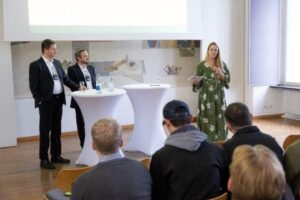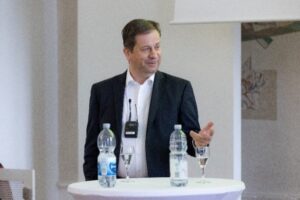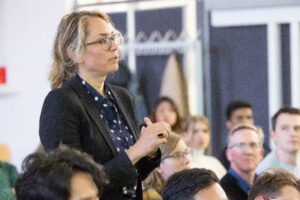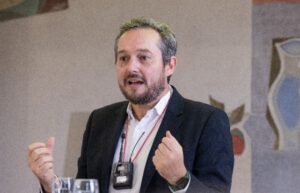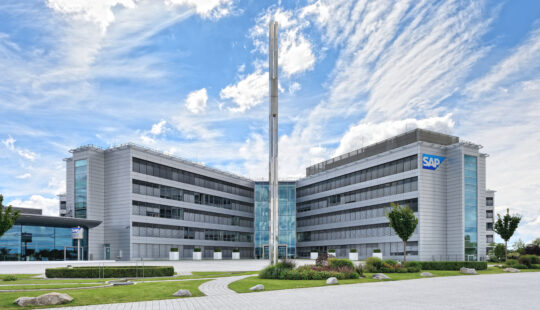As the world around us changes, digital transformation is an imperative for everyone – especially for businesses. They need solutions to global challenges that are innovative, sustainable, and quick and easy to integrate.
Enter ENGAGE.EU
ENGAGE.EU is an alliance of leading European universities that seeks to give the citizens of Europe the skills and expertise they need to overcome the major issues facing society today.
Among these challenges and progressive European topics are digital transformation and artificial intelligence (AI), climate change and what it means for sustainable economies, and the economic crisis caused by the COVID-19 pandemic. All of which are having lasting effects on the economy and society and require us to adopt new ways of thinking.
Think Tank at the University of Mannheim
To give academics from a range of disciplines an opportunity to examine these challenges in more detail, the first ENGAGE.EU Think Tank was staged at the University of Mannheim – not far from SAP headquarters in Walldorf.
The event was open to all academics studying at an ENGAGE.EU university who are interested in digital transformation and its impact on the economy, law, and politics. As such, the think tank acted as a forum for interdisciplinary academic exchange between a Pan-European network of universities.
Given the problems we face today, supply chains – the beating heart of the global economy – are the subject of intense debate. They were also the focus of comments made at the think tank by two guest speakers from SAP: Luka Mucic, CFO and member of the Executive Board of SAP SE, and Kristian Schier, chief architect, SAP Product Engineering. The discussion panel they took part in was open not just to think tank researchers, but also to all students and faculty members from the University of Mannheim.
“The current economic status is unsustainable. Looking at the challenges we are presented with – not only with regards to supply chains – it’s clear that companies need to work with governments and society and play their part in finding a solution together,” said Mucic. He added that transitioning from linear supply chains to agile, more transparent, and resilient models is vital to building the resilience to withstand crises now and in the future. Supply chains, he said, need to be sustainable by design and become more circular, adding that technology plays a decisive role when it comes to mapping and managing the complexity involved.
While supply chain costs are increasing, not least due to rising gas prices, there is also the problem that supply chains require too much energy and emit too much CO2. To address this, companies must first become aware of their role in the overall supply chain. Then companies need to think about how processes can be improved. Schier and Mucic both pointed to automation as one of the keys to success. “Using connectivity technologies to link production with sales and purchasing means that a machine knows, for example, what quantities of materials to order – and when. That makes it possible to automate and optimize ordering processes,” explained Schier.
Why Is SAP Involved?
New digital technologies are transforming the economy and society. But, societal change also requires innovations in science, business, and politics. “We see the collaboration between leading European universities that is at the heart of ENGAGE.EU and their interaction with society and business as a huge opportunity. We at SAP support these efforts aimed at shaping societal change together and advancing the progress of digital transformation,” said Dr. Katharina Schäfer, global head of SAP University Alliances. One of ENGAGE.EU’s key themes is the transfer of digital skills to young people to enable them to drive this transformation forward. In this context, SAP is working closely with the ENGAGE.EU Consortium as part of the SAP University Alliances program. More opportunities to bring the academic community together are in the pipeline, including a joint study program in digital transformation due to begin next year.
Together, ENGAGE.EU and SAP focus on societal challenges such as climate change, digital transformation, and new technologies like artificial intelligence. The use of cloud software for teaching and research is of central importance for SAP University Alliances. SAP is therefore opening up applications and platforms for scenario- and problem-based research and teaching purposes so that they can be used to find solutions to these challenges.
This is where the aim of ENGAGE.EU and the vision of SAP University Alliances coincide: in transferring digital skills to young people to enable them to shape their own future.
The collaboration between ENGAGE.EU and SAP illustrates the importance of close cooperation between industry and academia to develop solution strategies for upcoming global challenges while empowering and engaging engaged European citizens.
Photos by Katrin Glückler

